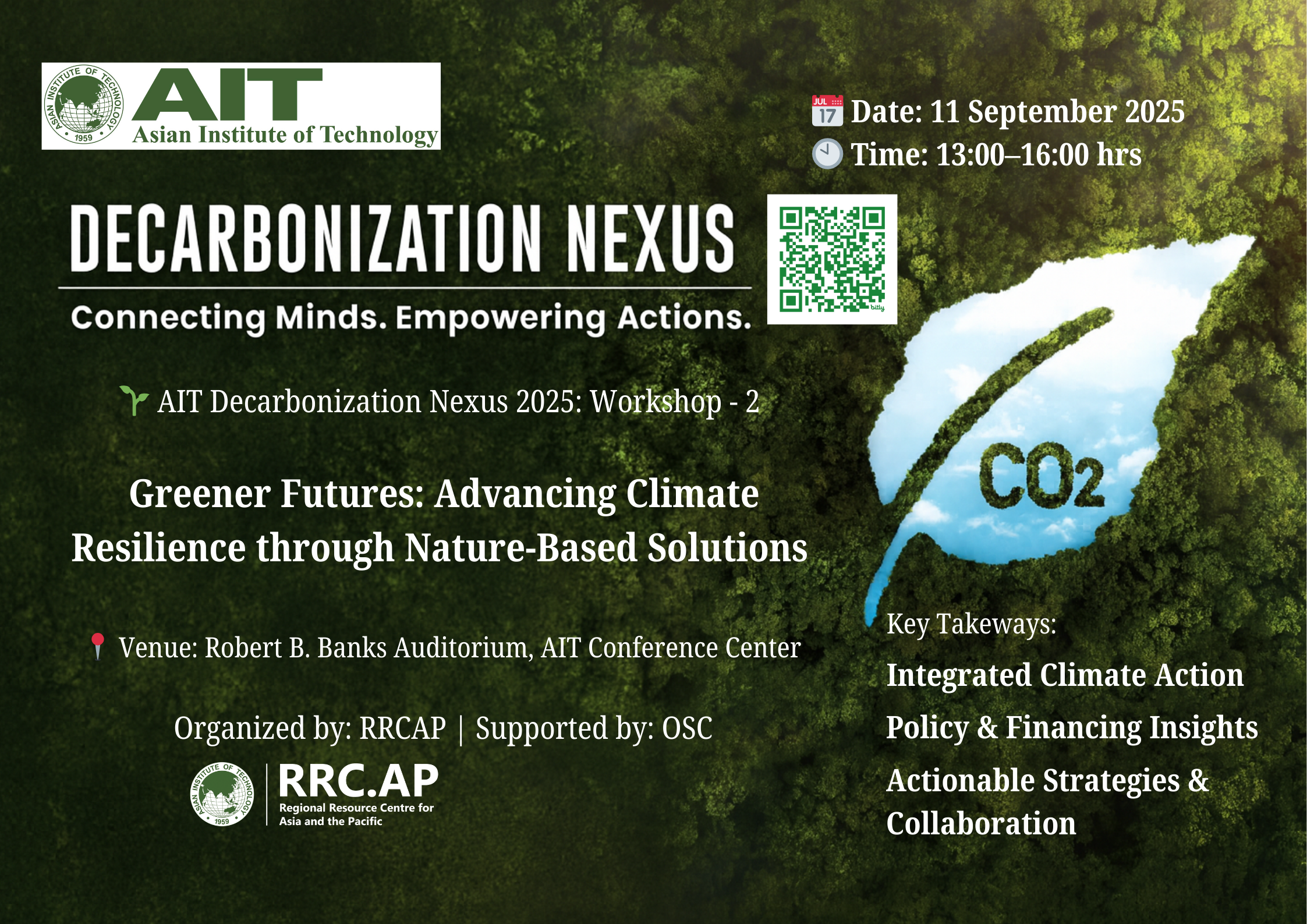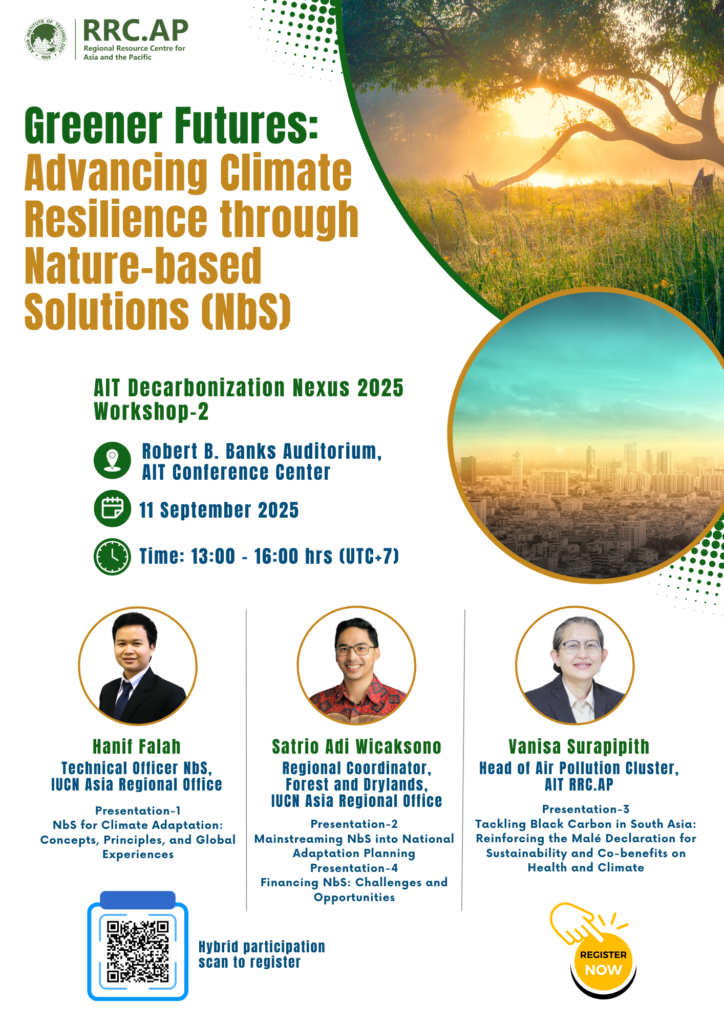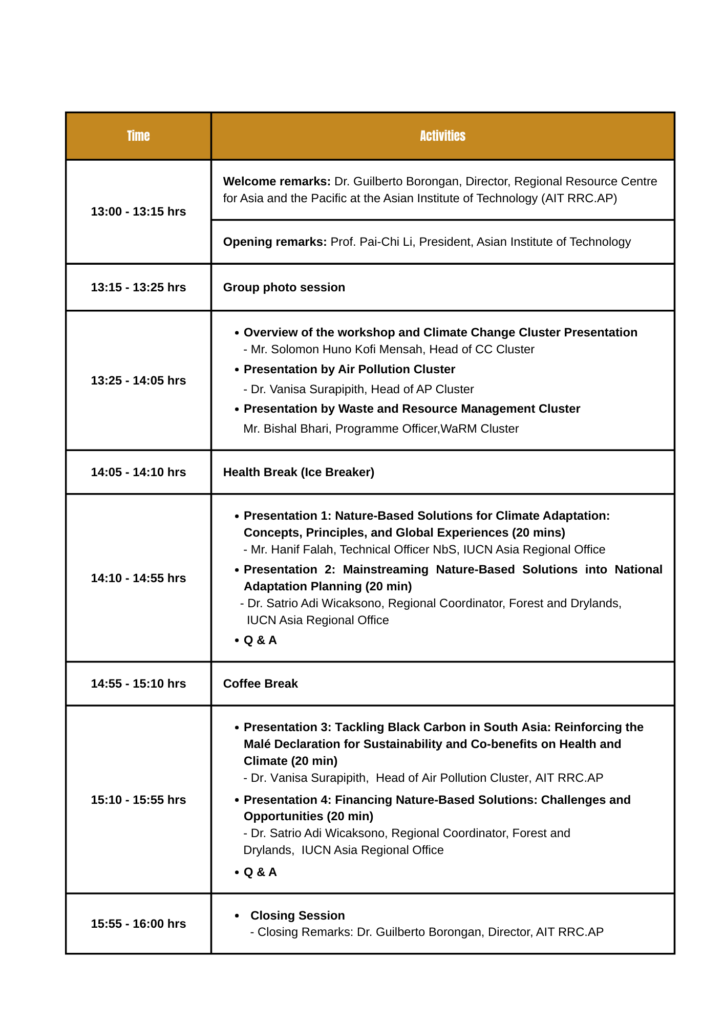

AIT Decarbonization Nexus 2025
Workshop by Regional Resource Centre for Asia and the Pacific
Workshop Title: Greener Futures: Advancing Climate Resilience through Nature-Based Solutions
Date: 11th September 2025
Time: 13:00 – 16:00 hrs.
Venue: Robert B. Banks Auditorium, AIT Conference Center
Click here to register!
Background and Rationale
Climate change poses increasingly complex challenges to sustainable development, environmental integrity, and human well-being. As countries pursue ambitious decarbonization efforts to fulfill the goals of the Paris Agreement, there is a parallel and urgent need to strengthen the resilience of vulnerable communities and ecosystems to impacts of changing climate. Addressing this dual challenge requires integrated strategies that simultaneously reduce greenhouse gas emissions and enhance the adaptive capacity of socio-ecological systems to cope with climate impacts.
Nature-Based Solutions (NbS) present a compelling, multifunctional strategy to address climate and environmental challenges. As defined by the International Union for Conservation of Nature (IUCN), NbS are actions that protect, sustainably manage, and restore natural or modified ecosystems to respond to societal needs, while providing co-benefits for both biodiversity and human well-being. When strategically implemented, NbS can make substantial contributions to climate change mitigation through carbon sequestration in forests, wetlands, and soils. Concurrently, they play a critical role in enhancing resilience by reducing climate-related hazards such as floods, droughts, and heatwaves while also supporting food and water security, improving ecosystem services, and promoting biodiversity conservation.
Moreover, NbS provide inclusive, cost-effective, and scalable adaptation strategies that are well-aligned with long-term sustainable development goals. Despite increasing global recognition of their potential, however, NbS remain insufficiently integrated into national climate strategies. This gap is often due to fragmented policy frameworks, constrained financial resources, limited technical capacity, and challenges integrating ecological approaches into industrial transitions and urban development.
In this context, this workshop, organized by the Regional Resource Centre for Asia and the Pacific (RRC.AP), under the framework of the Decarbonization Nexus 2025 aims to explore the potential of NbS as an innovative and integrative approach to advancing both climate resilience and adaptation. By emphasizing the interlinkages between natural ecosystems and broader decarbonization efforts, the workshop will highlight the importance of cross-sectoral dialogue, addressing of policy and knowledge gaps, and promotion of actionable strategies for scaling up nature-based solutions to advance a low-carbon, climate-resilient future.
The RRC.AP focuses on knowledge sharing and capacity-building to advance environmental sustainability, climate resilience, and regional cooperation across the Asia-Pacific region. Through policy advisory services, applied research, and stakeholder engagement, the RRC.AP supports countries in addressing complex environmental challenges. Its work is organized around three thematic clusters: Air Pollution, Climate Change, and Waste and Resource Management, through which it promotes integrated, cross-sectoral solutions for sustainable development.
The Workshop Objectives
This workshop aims to advance the understanding and practical application of NbS as a strategic approach to achieving climate resilience and supporting decarbonization efforts. By bringing together diverse stakeholders and showcasing cross-sectoral practices, it will foster informed dialogue, identify enabling conditions, and outline actionable pathways for effectively integrating NbS into national and local climate policies and strategies. The specific objectives are as follows:
- To examine the role of NbS in enhancing climate resilience and supporting the transition to net-zero emissions.
- To identify policy, technical, and financing enablers that facilitate the scaling up and mainstreaming of NbS within national climate action frameworks.
- To promote inclusive collaboration and knowledge exchange by engaging diverse stakeholders and addressing key knowledge gaps, capacity-building needs, and research priorities essential for effective implementation.
Expected Outcomes
The workshop is expected to generate actionable insights and practical outcomes that contribute to the integration of NbS into climate adaptation and mitigation strategies. Through knowledge exchange and multi-stakeholder engagement, the workshop aims to deliver the following outcomes:
- Enhanced understanding of the role and effectiveness of NbS in advancing climate adaptation and decarbonization.
- Concrete insights and evidence-based recommendations to support the integration and scaling up of NbS in policy development and planning processes.
- Identification of knowledge gaps and research priorities to inform future implementation strategies and capacity-building initiatives.
Target Participants
The workshop is designed to engage a diverse group of stakeholders whose expertise, perspectives, and contributions are essential to advancing the application of NbS for climate resilience and adaptation. Target participants include government agencies, environmental organizations, researchers, urban planners, private sector actors, development organizations, climate funding institutions and members of academia. Special emphasis will be placed on engaging youth, women’s groups, and indigenous communities to ensure inclusive and locally informed outcomes.

